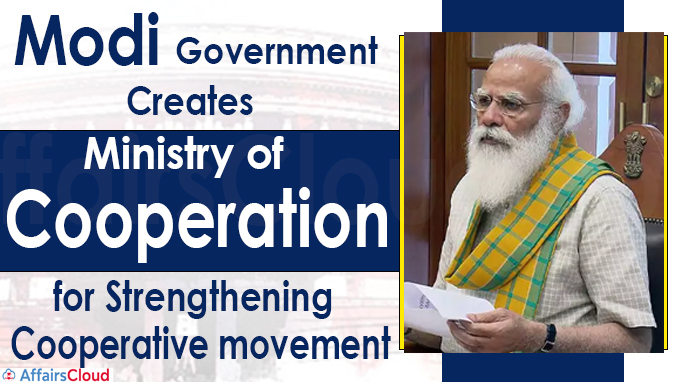 The Central Government has created a separate ‘Ministry of Co-operation (Sahkarita Mantralaya)’ to provide a separate administrative, legal and policy framework for strengthening the Co-operative Movement in India. The New Ministry has been carved out from the Department of Agriculture, Cooperation and Farmers Welfare, Ministry of Agriculture & Farmers’ Welfare.
The Central Government has created a separate ‘Ministry of Co-operation (Sahkarita Mantralaya)’ to provide a separate administrative, legal and policy framework for strengthening the Co-operative Movement in India. The New Ministry has been carved out from the Department of Agriculture, Cooperation and Farmers Welfare, Ministry of Agriculture & Farmers’ Welfare.
- Amit Shah will head this new ‘Ministry Of Cooperation’ along with Ministry of Home Affairs.
- The new process will help in realizing the government’s vision of ‘Sahakar se Samriddhi’ (prosperity from cooperation).
- The New Ministry will work to streamline processes for ‘Ease of doing businesses for cooperatives and enable development of Multi-State Co-operatives (MSCS).
- The announcement for creation of a separate Ministry for Co-operation was made by Union Minister of Finance, Nirmala Sitharaman during the Budget Session of 2021-22.
Legal Process
The New Ministry has been created through the creation of new rules under ‘Government of India (Allocation of Business) Three Hundred and Sixty Second Amendment Rules, 2021’ which amends the ‘Government of India (Allocation of Business Rules), 1961’.
- The President exercising his powers conferred by Clause (3) of Article 77 of the Constitution approved the amendment.
- The amendments were notified by the Cabinet Secretariat and will come into force at once.
Functions of Cooperation Ministry
i.Nine work areas have been allocated to the new Ministry including general policy in the field of co-operation and co-ordination of co-operation activities in all sectors, strengthening of cooperative movement in India.
ii.It will deepen the reach of the Cooperative to the grassroot level, creation of appropriate policy, legal and institutional framework, and National Co-operative Development Corporation.
Co-operative Societies
Co-operative sector industries are operated and owned by the suppliers or producers of raw materials, workers or both. They play a major role in ensuring a nation’s progress by helping the poor, illiterate and unskilled people to form a union to achieve their common socio economic goals.
i.In India, Cooperative movement plays a crucial role in the Agricultural sector, Banking, Housing etc. The Government has taken several steps in the past to strengthen the Cooperative sector of India.
- The National Cooperative Development Corporation (NCDC) was established by an Act of Parliament in 1963 as a Statutory Corporation under the Ministry of Agriculture & Farmers Welfare to plan, promote, coordinate and finance cooperative development programmes at the national level.
- A National Policy on Cooperatives was released in 2002 to boost the cooperative sector.
Legal Support to Cooperatives
- As per the 97th Amendment Act, 2011 and its inclusion as Article 19 (1) (c) of the Constitution, formation of cooperative societies is one of the fundamental rights of an Indian Citizen.
- Provision in Indian Constitution – Article 43B under the ‘Directive Principles of State Policy (DPSP)’ of Indian Constitution provides for promotion of Co-operative societies.
About Cabinet Secretariat
Cabinet Secretary – Rajiv Gauba




